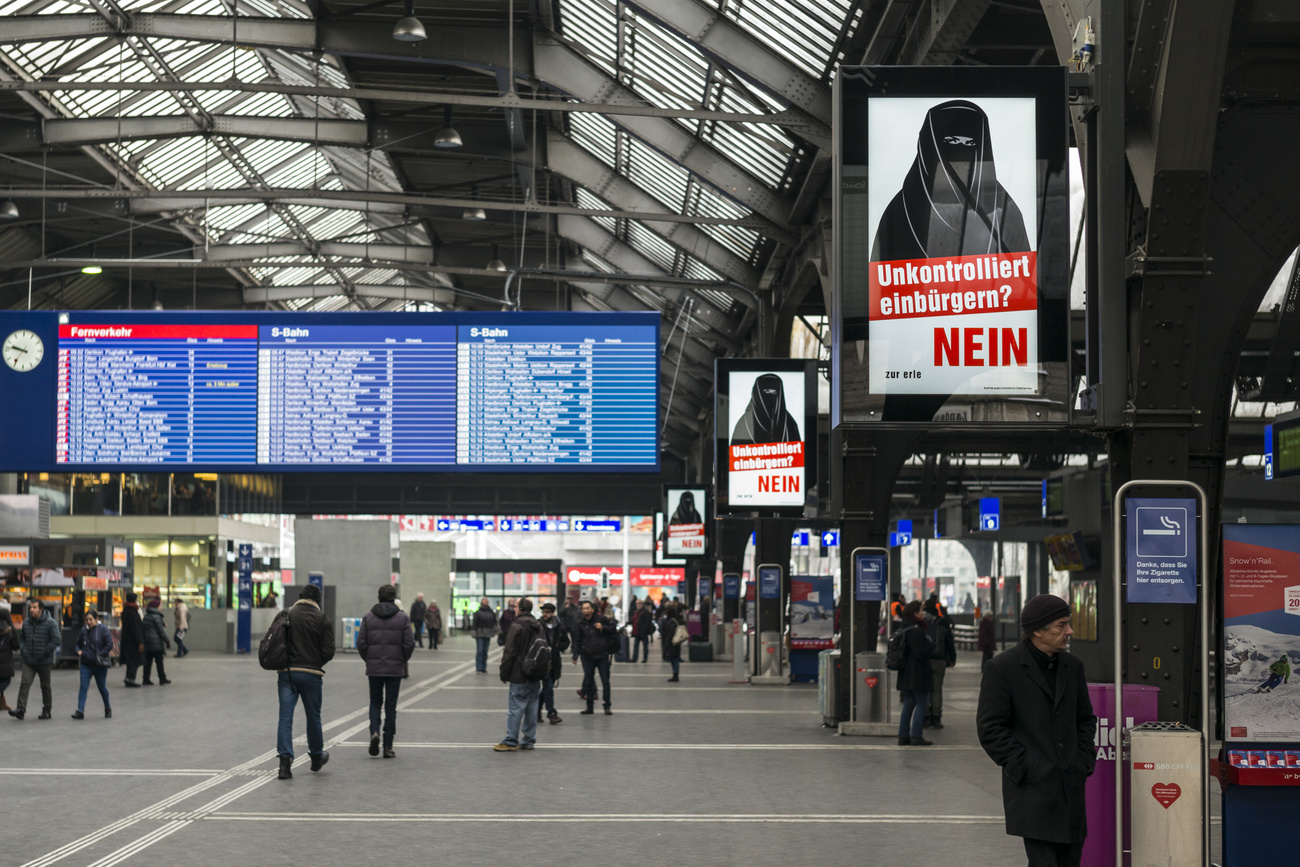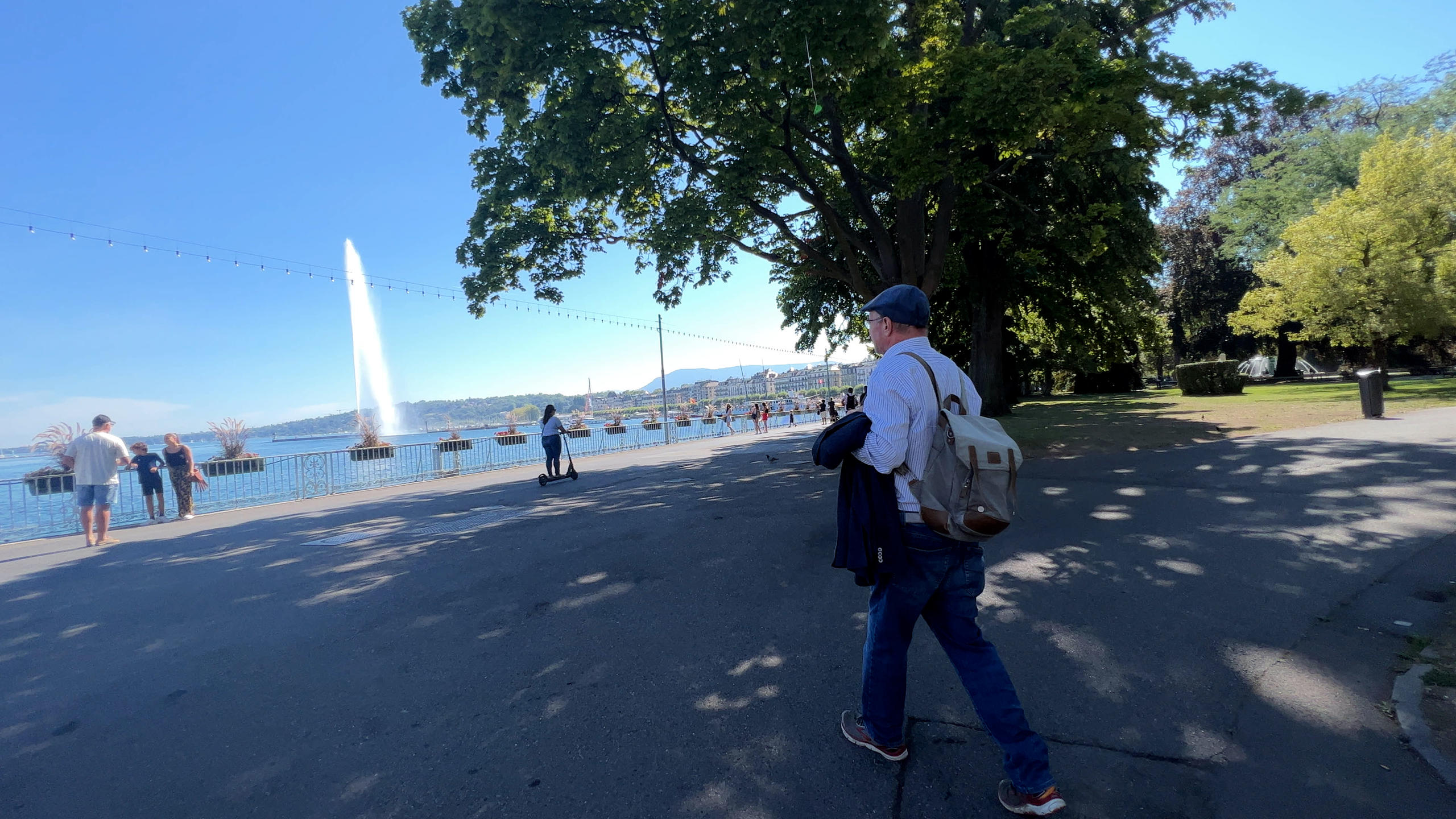‘A migrant is always both an immigrant and an emigrant’

Political scientist Victoria Finn researches the voting behaviour of those who enjoy the unique position of being tied to two different countries at once – migrants.
Finn, a researcher at the European University Institute in Florence, was this year’s winner of the “Migration & Citizenship Best Dissertation Award”, presented by the American Political Science Association. SWI swissinfo.ch spoke to her at the recent Geneva Democracy Week about immigrants, emigrants, and how they vote.
SWI swissinfo.ch: Your research on migrant voting rights and political participation is particularly focussed on Chile. What’s the situation there?
Victoria Finn: One reason I’m interested in South America is that various countries there are quite liberal about granting voting rights – Ecuador is another good example. In Chile, voting rights are not tied to citizenship: after five years in the country, you can participate in all local and national elections, in plebiscites, in referendums – everything.
Uruguay is also liberal about voting rights, albeit with some stricter conditions that make it more difficult to vote in practice. In Chile, if you meet a few basic requirements – you have to be 18, have a clean criminal record, and be a legal resident – you get on the electoral register.

SWI: It sounds like the perfect place for migrants who want to get involved politically.
V.F.: There is one problem: nobody tells you when you’ve been put on the electoral register. It’s an automatic process. Not all people know they have the right to vote. But awareness is growing little by little.
SWI: Nobody informs you about your political rights?
V.F.: Exactly. All you would need is an advertisement campaign, and everyone would know. But that hasn’t happened yet. Although Chile was one of the first countries in the world to give immigrants the vote – in 1925 for local elections – most political campaigns still don’t target immigrant groups.
SWI: Do voting rights for immigrants help boost their inclusion in society?
V.F.: That’s a tough question. People have already studied this in the Swiss case, because there is plenty of data about it – i.e. to compare cantons where immigrants have voting rights with cantons where they don’t.
For true inclusion, you need to have social, economic and political rights. If one of those areas is lacking, there is an imbalance. Nobody wants to get really involved in their community if they don’t have a political voice. Of course the priorities for integration are very individual. But after a certain time, people can’t be and don’t want to be mere migrant workers. Germany, with its Gastarbeiter [guest worker] programme, and Switzerland, with its special status for seasonal workers, had to learn this. People also need social and political rights.

More
Seasonal workers inspired Swiss ‘Together’ movement
SWI: How does this play out on the personal level?
V.F.: A migrant is always both an immigrant and an emigrant – this is something Luicy Pedroza has shown in her work. On the individual level it’s important to look at ties and belonging in both directions: immigrants are also emigrants from their home country. Venezuelans who came to Chile from their authoritarian country still keep up to date with what happens there; this affects them as emigrants, but it also colours their life in Chile, and it impacts the people around them. Societies have to learn to better understand both sides of this dual belonging.
SWI: One thing that kept coming up at the Geneva Democracy Week was the idea that citizenship means participation. But what does participation actually mean for migrants? Do they become just like citizens through their participation?
V.F.: When people participate, they are engaging in citizenship practices. I’ve found, in interviews and surveys, that immigrants and citizens have similar motivations when it comes to participation. On a human level, people get involved in politics because they want a well-functioning government and to ensure everyone’s wellbeing. You go to vote to pick the best candidate. For migrants the situation is just more complicated, because they live in and between two countries.
SWI: One country which they left, and another where they now live.
V.F.: Exactly. Being an immigrant and an emigrant shapes you as a person, and not only because you’ve lived under two different sets of laws. People who leave a country are different in some way. Their life trajectory is different. The transnational aspect changes how these people view and interact with the two countries.
Living in a different country will do that to you – it will change your sense of belonging and identity. Through migration, two completely new relationships arise: one between immigrants and the country where they now live, and one between emigrants and the country they left behind. This brings about a complete change in your societal role and your attitude towards the state. It can also have an impact on how you vote.
SWI: Are states keen to ensure the participation of emigrants?
V.F.: In democracies, yes. Most of them want their emigrants to keep voting. But diaspora politics goes beyond the question of democracy and dictatorship: almost all countries are wary not to push emigrants away, because they want them to keep travelling back; they want them to keep sending money back. Remittances are a huge aspect in many diaspora relationships.
SWI: Some Swiss emigrants might not feel the state wants them to keep participating. During the pandemic, for example, many of them didn’t receive their ballot papers on time.
V.F.: Identity, nationality and active citizenship are complex and personal issues. Many emigrants feel disconnected from their country of origin; maybe some of them left for political reasons and don’t want anything to do with it anymore. That happens.
SWI: And in Chile, I suppose, the emigrant community is still marked by the long dictatorship of Augusto Pinochet?
V.F.: Chilean emigrants are a very diverse group. It’s no longer just a community of exiles. They are now very scattered and politically diverse. But Chileans abroad only got the right to vote in 2014, and used this right for the first time in 2017. It’s a recent phenomenon.
SWI: Before this, immigrants could vote, but emigrants couldn’t?
V.F.: Yes. I’m writing a new research paper on this. Chile is an informative case study: a pioneer for immigrant voting and a latecomer when it comes to emigrant voting rights. The country allowed immigrants to vote at a time when there wasn’t very many of them; now they let emigrants vote when there are not so many of them. Since 2015, more people have been coming to Chile than leaving. The country took a while to recognise this.
Emigrant voting rights are common around the world: over 130 countries allow it, at least in certain elections. In Chile, however, emigrants had no political rights until recently. There’s a fear that exiles are more politically extreme, which is not always the case. On the flip side, we now see the same situation regarding Venezuelans.
SWI: What are the fears regarding Venezuelans in Chile?
V.F.: Venezuelans who came to Chile in 2016 can now vote. Some people are wary about how and for whom they will vote. But people adapt to new political parties and systems. Migrants can be ideologically flexible, and they don’t necessarily tend to gravitate towards a radical party, just because they come from a certain country.
Dr. Victoria Finn is a Max Weber Fellow at the European University Institute in Florence, Italy. She holds a PhD in Political Science from Universidad Diego Portales (Chile), a PhD in Humanities from Leiden University (Netherlands), and a Master’s degree in International Affairs from George Washington University (US).
Finn publishes on migrant voting habits, citizenship, and South American migration governance. She is the 2022 recipient of the APSA (American Political Science Association) Migration & Citizenship Best Dissertation Award for her work on migrant rights, voting, and resocialisation in Chile and Ecuador.
Adapted into English by Domhnall O’Sullivan
PLACEHOLDER
In compliance with the JTI standards
More: SWI swissinfo.ch certified by the Journalism Trust Initiative













You can find an overview of ongoing debates with our journalists here . Please join us!
If you want to start a conversation about a topic raised in this article or want to report factual errors, email us at english@swissinfo.ch.